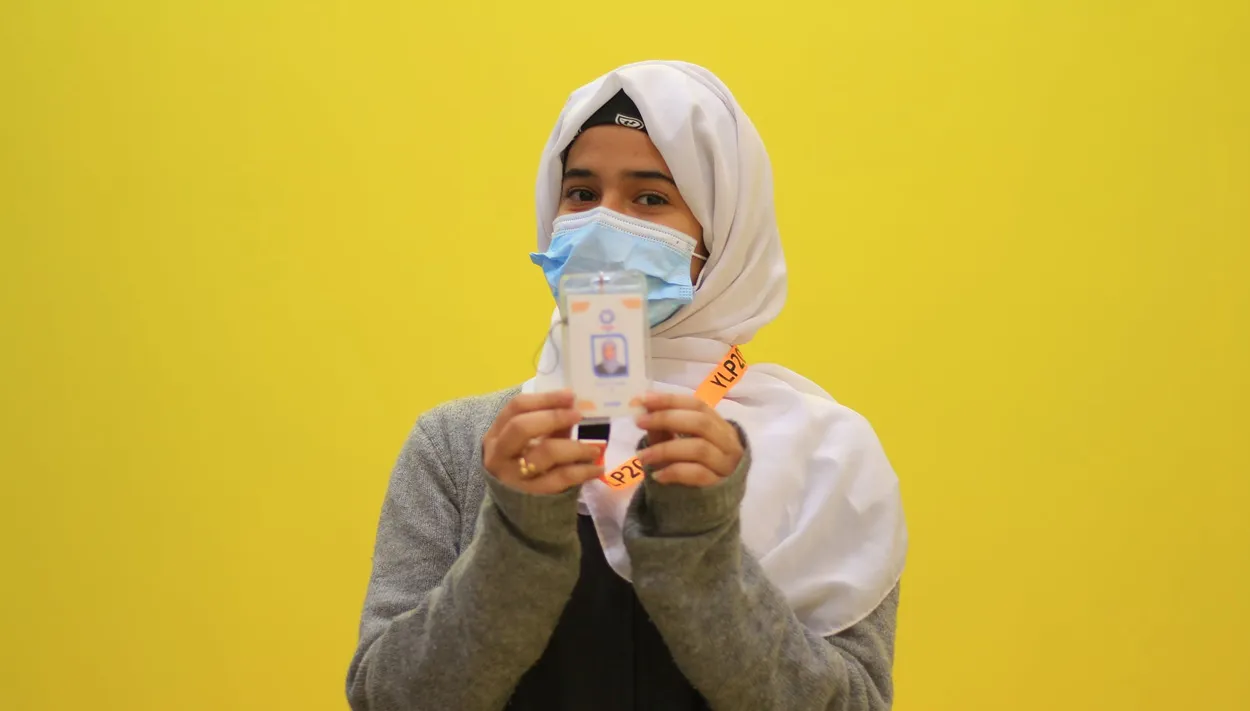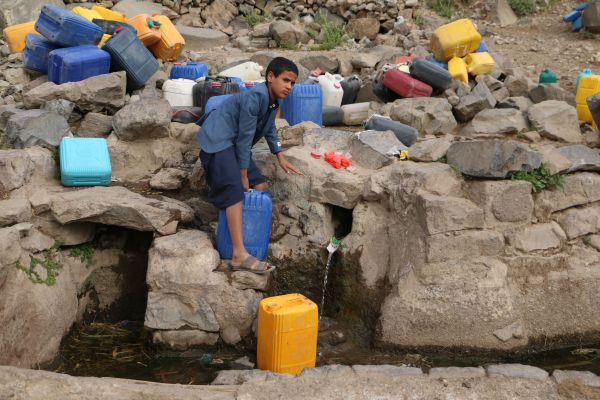"Apprenticeship" Program Rescues "Ghazi" from Unemployment
With great difficulty coupled with determination and perseverance, Ghazi Jaber (21 years old), one of the youths of the Bajil District in Al Hudaydah Governorate (western Yemen), was able to pass the secondary education stage, and then graduate to a world full of life challenges imposed by the war on Yemenis about eight years ago. "I didn't have another choice; my exceptional circumstances and the financial situation in which the citizens live in the Tihama plains, prompted me to work during my studies, and after graduating from high school,” Ghazi says.
Ghazi left no field of work but to work in it; In the markets, farms, and shops... This was with the aim of gaining experience or a craft through which he could earn and support his family of 7 members. Ghazi says: "Since my father's death, I have been the head of the family, a great responsibility that has been placed upon me since I was eleven years old. I did not leave a job without working on it. Immediately after graduating from high school, I worked for more than a year and a half as an assistant electrical engineer in the rural area of Bajel district. The amount I earned for my work was not enough to buy food for my family members one day in light of the crazy rise in prices, but my passion for this work was the way that gave me patience for all that. There were days passed with no work we have, and weeks went by and we were unemployed, At the time, my family and I were going through the worst conditions."
He continues: "A friend advised me to enroll in the apprenticeship program, as an experience and with a bit of luck, I applied for this training in which I did not expect to be accepted, as I do not have any qualifications other than a high school certificate, but I was accepted. I was surprised by the news of Acceptance, and I was very happy then, I felt that many doors of luck will open after this training.”
What Ghazi expected actually happened, as new horizons were opened for him, after eight months of intensive vocational training that he underwent with 390 male youth from the governorates of Hodeidah and Hajjah, within the “Apprenticeship” project implemented by Youth Leadership Development Foundation with the support of the International Labor Organization "ILO", which aims to train and qualify youth (female and male) in professions that are in high demand in the labor market.
In light of the continuous power cuts in most Yemeni governorates for seven years, Yemenis have turned to use solar energy to generate electricity and benefit from it, especially in rural areas where government electricity has not yet reached, which created a job opportunity for a middle class of youth; like Ghazi, who is currently working in the installation and maintenance of solar systems, after the extensive training he received as part of the apprenticeship project.
He says, "Now I am working in the installation of home and agricultural solar systems in most areas of Bajil District. The training and toolkit that the YLDF provided me helped me a lot in my work. Before, we used to install solar systems in primitive and random ways, but now I'm doing it in scientific and systematic ways."
Ghazi describes his experience with confidence and enthusiasm, after training within the apprenticeship project, saying, “Now I can actually say that many doors have opened for me in the labor market as a solar energy systems engineer, and my work, performance and income have improved, thanks to God first and then through the apprenticeship program and the Youth Leadership Development Foundation.” Second, I hope that this project will continue to benefit other young people as I and the rest of my colleagues have.”
The apprenticeship project comes within the framework of the strategic approach that the YLDF is working on. This time, in its fifth edition, about 400 youth(Female and male) benefited from it, through intensive vocational training carried out by a group of qualified cadres and experts. These trainings are based on modern curricula that follow the style of Professional competencies and avoid the weakness found in the old traditional curricula.
Kafia Al-Afif, Program Manager of the apprenticeship project, says that the project aims to empower youth and provide them with skills and experiences that make them qualified to enter the labor market, stressing the importance of the project, "because it targets needy groups, and does not require a specific educational level, as it includes several categories of male youth, including illiterates and people who have not completed their education, is a real opportunity to create financial sustainability for youth and poor families even in rural communities.”
It is worth noting that the apprenticeship project trained and qualified more than 1,500 youth (Female and male) from different governorates of the Republic in a number of professions, and provided them with professional skills through which they were able to work and establish small projects that guarantee them and their families a sustainable financial income, in the context of the vision of the Young Leaders Development Foundation, which seeks To economic empowerment, and to increase the capabilities of young men and women to keep pace with the needs of the labor market, by providing modern training curricula and practical and innovative methodologies in on-the-job training, apprenticeships and mentorship.
For his part, the community activist, Anwar Rajeh, believes that what the YLDF is doing is an honorable model that other civil society institutions should follow in the same footsteps, through economic empowerment programs and rehabilitation of youth and families, and making them productive individuals.
According to Rajeh, “Most of the local and international institutions and civil society organizations are satisfied only with distributing aid, and this is negative - even if it was not intended - because in the long run, it makes community members only recipients, waiting for the time to disburse this aid, and this may be a reason for The reasons for the high unemployment," he said.
As for Ghazi, he does not find it necessary to advise his young peers not to succumb to circumstances and the frustrating reality, and to deal with it as the end point, alluding to the truth of its content: “Do not seek for a living and forget yourself, try to develop your skills and abilities, because you will remain in your place spinning.” In vicious circles if they do not develop, opportunities exist for those who seek them.”






